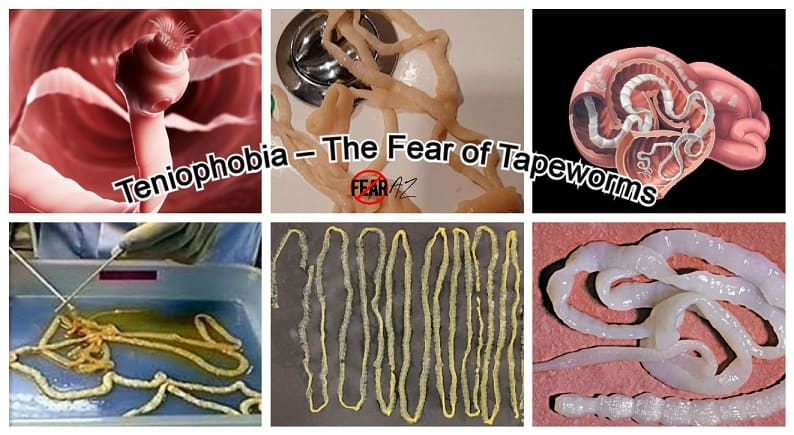Share This Article
Teniophobia: The Fear or Disgust of Tapeworms
Do you have an excessive fear of tapeworms? Why? Well, it could be because of stories like this: Eighty-two feet long. That’s the measurement of the longest tapeworm ever removed from a person. The poor man had this unwelcome resident in his small intestines for months or maybe years.
No wonder many are wary of getting these parasites. It’s normal to shudder at the thought of eating food infested by worms. But what if you can’t stop worrying about getting tapeworms? If this fear disrupts your daily life, you may be suffering from teniophobia.
Phobias are hard to overcome, but your recovery starts when you decide to fight your fear. To beat teniophobia, it helps to learn everything you can about it.

What Is Teniophobia?
First off, both these terms mean the fear of tapeworms: taeniophobia or teniophobia.
Teniophobia is the fear of tapeworms. It is derived from the Greek terms taenio, meaning “tapeworm,” and phobos, meaning “fear.”
This is a highly specific phobia with a definite trigger. In this case, phobia sufferers are afraid of tapeworms. Worms are gross, but teniophobia doesn’t refer to mere disgust. Instead, the phobia is a severe fear of getting tapeworms from food.
Teniophobia is related to helminthiphobia, vermiphobia, and scoleciphobia. All these terms refer to the fear of worms or being infested by them. Teniophobia causes one to be extremely wary of tapeworms or even the thought of getting them. In severe cases, a teniophobic may even suffer from panic attacks.
When you have teniophobia, you may allow your fears to dictate your routine. You avoid situations that trigger panic. You don’t need to see or have tapeworms to have a reaction. The thought of being in that situation is enough to scare you. But why are people so afraid of such tiny creatures?
What’s So Bad about Tapeworms?
Tapeworms are flatworms found in the intestines of animals and humans. They have a ribbon-like body and a small head. These worms have hooks and suckers to attach to the intestines. The parasites lay eggs that come out with human feces. These eggs end up in the soil, water, or in unclean food. If present in the body, they consume nutrients from digested food. Having internal worms can cause malnutrition and other serious illnesses. What’s worse, tapeworms have been known to travel to the brain. If this happens, the infected person may suffer from seizures, visual impairment, or even death.
What Are the Causes of Teniophobia?
Are you wondering, Why do I have worm phobia? Generally, phobias don’t have a definite cause. However, they are more likely to develop when influenced by genetics. Sometimes, this condition can be traced back to a traumatic experience. Let’s take a closer look at the most plausible teniophobia causes.
Genetics
If a person has a genetic predisposition to mental illness, they are at a higher risk of developing phobias such as teniophobia. A single triggering event can contribute to a full-blown phobia developing.
Trauma
The death of a loved one due to a tapeworm infection is one reason some develop an aversion to tapeworms. Others experienced being hospitalized as children due to these parasites. As a result, the negative feelings lingered and became a cause of the phobia. You may have also read or watched a dramatic news article about extreme cases of tapeworm infections. These may be so scary that you end up with teniophobia.
What Are the Symptoms of Teniophobia?
No one wants to get infected with tapeworms. It’s normal and recommended to take basic precautions to avoid food contamination. However, those with teniophobia take extreme measures to make sure they are never exposed to tapeworms. These may include:
- Refusing to eat fruits and vegetables since they may have parasites
- Refusing to eat meat altogether due to their fear of the animal being infected
- Compulsively washing hands
- Overcooking meat
- Moving to or staying in countries where tapeworms are not common
Here are the telltale signs that you may have this phobia:
Physical Symptoms
- Breathlessness
- Nausea
- Sweating profusely
- Dry mouth
- Shaking
- Rapid pulse
- Rapid breathing
- Irregular heartbeat
- Chills
- Tightness in the chest
- Headache
- Numbness or tingling
- Hyperventilation
Mental/Emotional Symptoms
- Dread
- Extreme anxiety
- Inability to articulate words
- Fear of losing control
- Confusion
- Anger
- Fear of dying
- Withdrawal
- Guilt
Teniophobia symptoms vary from person to person and depend on the severity of their condition. These symptoms are common among phobias and anxiety disorders.
Self-Help Guide to Teniophobia
Specific phobias develop in early life and tend to go away. But if it follows you to adulthood, treatment is needed. To learn how to cope with stressful times, here are some positive additions you can make to your routine. They will help you better cope with your anxiety.
Yoga
Yoga is a form of moving meditation. You move your body into various positions while breathing deeply. Practicing yoga leads you to a more healthy life. It focuses your mind on betterment rather than anxious feelings.
Meditation
Meditation requires practice and consistency. When you master meditation, it brings a beautiful change in how you react to the object of fear. It distracts your mind from worrying and allows you to focus on something more worthwhile.
Cardio Workouts
Put your body through strenuous exercises like biking, swimming, or running. Exercise releases happy hormones in your body, which ease anxiety and allows your body to respond better to perceived stressors.
Seeking Professional Help
Consult a professional if you don’t see any positive change with self-help techniques. Seeking professional help may seem unimportant when you can simply avoid uncomfortable situations. You may feel in control right now, but in reality, the phobia is getting a firmer hold on you. There is no definitive treatment available for teniophobia. However, you can take advantage of psychological techniques that work with most phobias.
These include:
- Cognitive behavioral therapy
- Talking therapy
- Dialectical behavior techniques
- Mindfulness-based stress reduction
- Exposure therapy
Some of these methods involve counseling, while others involve confronting your triggers directly. The treatment chosen by your mental health professional will depend on the severity of your condition.
How to Overcome Fear of Worms
It’s fairly easy to avoid parasites. Proper hygiene and sanitary food preparation should ensure that you don’t catch tapeworms. However, those with teniophobia may go above and beyond to avoid getting them. Only you know your level of fear and only you can let it go.
Teniophobia treatment starts the day you decide to prepare your mind and body to face the fear. Overcome your aversion to tapeworms by preparing for encounters rather than avoiding them.
- Acknowledge your fear and try to understand your feelings towards it.
- Don’t try to rationalize the perceived impact tapeworms have on your life.
- Recognize your thought patterns. Identify the unhelpful ways in which you choose to think and act.
- Give yourself time. These methods are not an instant fix for your phobia.
- Don’t forget the basics like a healthy diet, regular exercise, and sufficient sleep.
Fear preys on you when you avoid it. But with professional intervention and self-help techniques, you can overcome teniophobia.
Conclusion
Don’t let teniophobia take over your life. It may seem like tapeworms are everywhere, but it’s possible to avoid dangerous parasites without going overboard. With these tips and information, you’ll soon be able to lead a normal life, free of anxiety. Be kind to yourself as you overcome your fear of worms. In time, you can enjoy that medium-rare burger or juicy pork chop without a single worry.



